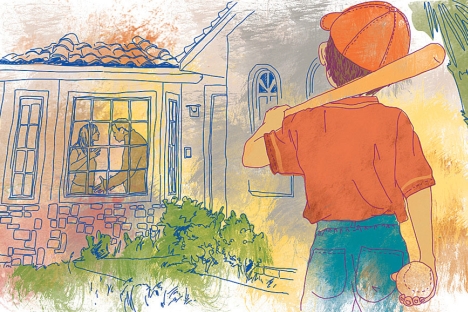
Drawing by Natalia Mikhaylenko. Click to enlarge the image.
Neil Armstrong, the commander of the Apollo 11 Lunar Module who died in August, had a necessarily distant but nevertheless special relationship with Yuri Gagarin, and not only as the first person to set foot on the moon with the first person to have entered space.
Apart from Armstrong’s greater height – his nickname was “Stretch” – the two men resembled one another physically and otherwise. Country lads who traveled far from home educationally as well as geographically, both were good souls who behaved with modesty, dignity and friendliness during a time when many super-patriots were inciting fear and hatred. Surely that helped generate the kinship Russians felt with Armstrong when he visited in May 1970, 25 months after Gagarin’s death and ten after his moon flight.
Cold War or no Cold War, he was given a tumultuous welcome, with near wild applause. But no resident of Moscow, Leningrad or anywhere else in Russia could have helped solve a mystery about the man, even if they’d been asked.
Armstrong’s first words after descending the little ladder to the moon’s surface quickly entered at least the second tier of the world’s most famous sentences.
“That’s one small step for man, one giant leap for mankind.” Televised to earth, the eloquent declaration enabled half a billion people, a sixth of the world’s population, to share the thrill and enjoy an additional uplift from feeling unified in the exploration. In Moscow, where I was then working, disappointment that a Soviet cosmonaut hadn’t been first in that phase of the Space Race didn’t stop watchers and listeners from congratulating me as if I’d had something to do with the feat.
Russians were genuinely happy for humanity, as Armstrong wanted them to be, and for me personally. However, no one then or during the next quarter-century could make head or tail of a remark he was said to have made just before re-entering his module: “Good luck, Mister Gorsky.”
Mister Gorsky? Who was he? A Soviet cosmonaut, many NASA personnel assumed. Indeed, before leaving the moon, Armstrong left a satchel there containing medals commemorating Gagarin and Vladimir Komarov.
Komarov, who commanded the Soyuz 1 with which the Soviet Union had hoped to reach the moon first, with Gagarin as his backup, was killed in 1967 when his parachute failed to open. But no amount of checking found a Gorsky of any kind in the Soviet space program, and when “Stretch” was asked about it, he always answered with a smile and nothing more.
The smile stayed in place and the enigma grew. On it went for 26 years until July 1995, when a reporter asked the question during a Q&A that followed a talk the veteran astronaut gave in Tampa: Mr. and Mrs. Gorsky, it turned out, had been Armstrong’s neighbors.
While he was playing in his backyard, a friend hit a baseball into his neighbor’s yard, toward which young Neil hurried to fetch it. Leaning toward the ball beneath the Gorskys’ bedroom window, he heard a shout from Mrs. Gorsky. “Sex? You want sex? You’ll get it when the kid next door walks on the moon!”
I don’t know whether to be happy or sad that this entire story, much repeated for more than a decade, was eventually revealed to be apocryphal, an urban legend, I do know that the Russian affection for Armstrong was genuine.
Shortly after his death, Vladimir Popovkin, the head of Russia’s space agency, said his colleagues there remembered him “as an exemplary spaceship pilot: modest in his ways, always correct in his dealings with people, with a fine sense of humor when that was appropriate while, first of all, being demanding of and hard on himself. For us, he’ll always remain the model of fulfilling the common man’s dreams.”
“In a Bertolt Brecht play,” a popular Soviet website called Gazeta added, “Galileo answered a colleague’s ‘unhappy is the land that breeds no hero’ with ‘No, Andrea, unhappy is the land that needs a hero.’
Neil Armstrong, the child of the struggle between two such ‘unhappy’ countries...nevertheless lived a long and, we hope, a happy life.” What fittingly generous tributes! How encouraging that rivals can be good sports! And the Russian emotion, which went well beyond sportsmanship, can also serve as a model for how we talk about each other publically. May we please have more of it?
George Feifer is the author of many acclaimed books, including "Moscow Farewell" and "The Girl from Petrovka."
All rights reserved by Rossiyskaya Gazeta.
Subscribe
to our newsletter!
Get the week's best stories straight to your inbox